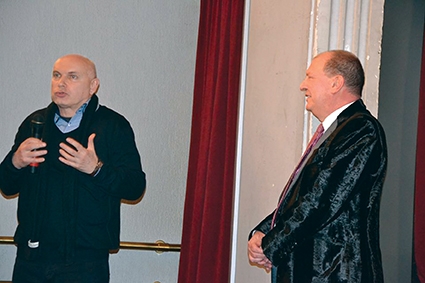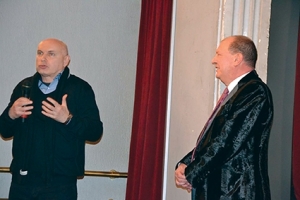Russians and Georgians: A Documentary Film Boosting People-to-People Relations
On December 18, the Alexander Griboedov Russian Drama Theater presented a screening of the documentary film ‘Russians and Georgians,’ directed by historian, political scientist and literary worker, Evgeny Kozhokin. The hall was packed, perhaps to be considered proof that we two peoples want to remain friends, notwithstanding the confrontation of our governments.
This was a movie-tribute to the memories of our deceased glorious writers, cultural workers and scientists, as well as contemporary Georgians living and working in Russia, and to outstanding Russians living in Georgia.
The soiree was opened by Nikolai Sventitsky, Director of the Griboedov Theater, President of the Russian Club and organizer of the screening, who recently received the award “Father of Georgian Culture”.
Russia-educated Sulkhan-Saba Orbeliani, Ilia Chavchavadze, Akaki Tsereteli, Vazha Pshavela, and Alexander Chavchavadze were mentioned, as were scientist and historian, founder of Tbilisi State University, Ivane Javakhishvili, and philologist Niko Marr. Cinema and theater directors Mikheil Chiaureli, Giorgi Danelia, Kote Marjanishvili, Robert Sturua, and Temur Chkheidze were also listed. “In spite of the political cataclysms, nobody has been able to sow a conflict between our two nations,” Sventitsky said.
The film begins with an interview with Oleg Tymchenko, a famous Russian painter living in Georgia, who says that the real pleasure for him is not the process of painting itself, but the mere start, when the idea comes, and the final moment, when the result is seen.
In Russia there are 500-600 thousand Georgians. However, Tymchenko names Zurab Tsereteli, famous sculptor and painter, first and foremost. Then, Avtandil, a Georgian painter, appears in the film, confessing that as he did not speak English, Russia was a logical destination for him. “Those who buy my pictures do not just buy and leave, but make friends with me,” he says, adding that there are lots of things that concern him, and that make him happy. “But it does not matter, the main thing is to work, feed my family and respect Art,” he says. “Sometimes, I have no idea where my pictures have been sold. The two most exotic places I recollect now are the Philippines and Santiago.”
Sonya is a Russian girl living and working in Tbilisi: “I’m a shoe designer. I wanted to go to Italy or Austria, but then I realized that I had to first attend the famous Armenian school.” On her way to Georgia’s neighboring country, she was asked by one of her Georgian friends to meet on Georgian soil and after that, Sonya stayed, reportedly unable to bear to leave Georgia. “’Malina, malina’ is the familiar call of the women raspberry sellers here. It is a well-rooted barbarism in the Georgian language,” Sonya says. “I find many differences in our genetic code, including the attitude to the family, to religion…” she adds, noting the so-called Italian courtyards, where families live in close-knit communities, sharing joy and sorrow. “They might quarrel, but I’m amazed at the unity of neighbors when someone amongst them is ill, and all the rest help out.”
Then, a Russian pedagogue working in a Georgian school speaks: “Georgian children hardly know Pushkin or Lermontov (also proven by a street poll), but many know Dostoyevsky and Tolstoy as they are fashionable authors now. If you have read any of the latter, you are “in”!”
Then, from the mouth of a Georgian teacher in Russia, we hear that many Russians of different profession and age study the Georgian language. There is even one priest who first met a Georgian man in the army, and then became interested in Georgia. “We are similar even in our sins,” he says.
During the discussion following the screening, one of the attendees wished very much that such a film could be turned into series and that a Georgian would make a film in response.
It seems there are two Russias: one that is our enemy, and another that remains a country of great culture and a nation that is connected to us by a strong mutual understanding and esteem.
“This is a very important film,” Olga Bickbabick, one of the protagonists of the film and a teacher of Russian in a Georgian school, told GEORGIA TODAY after the screening. “I perceive it as a mosaic of thoughts and destinies, all perfectly well fitted into the key-note of location and love.”
Maka Lomadze











